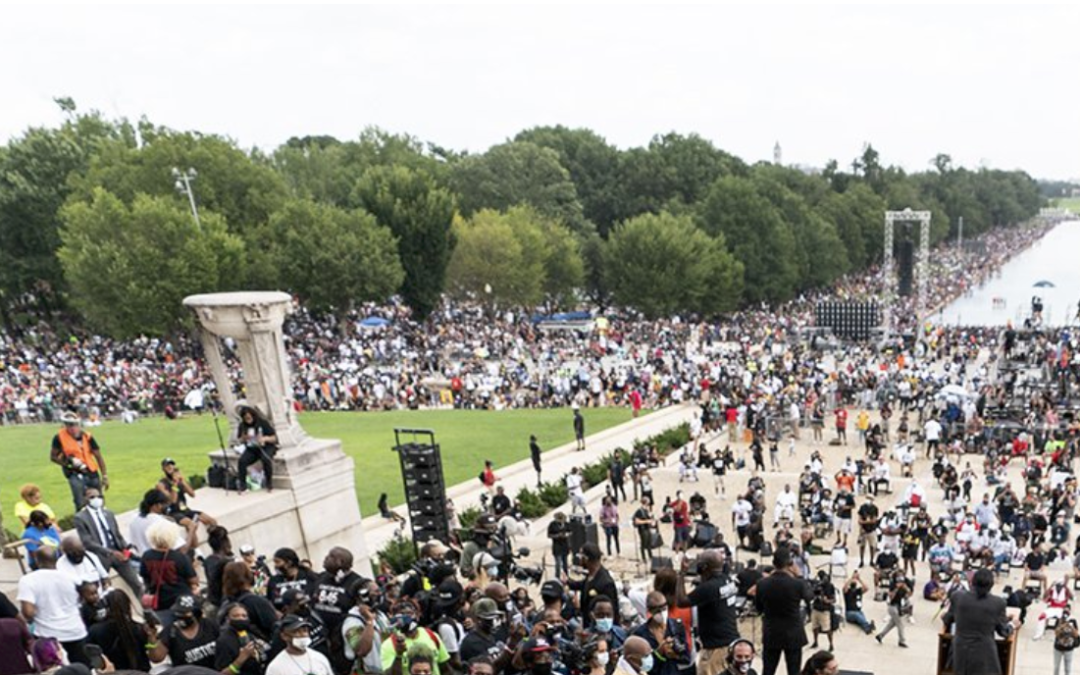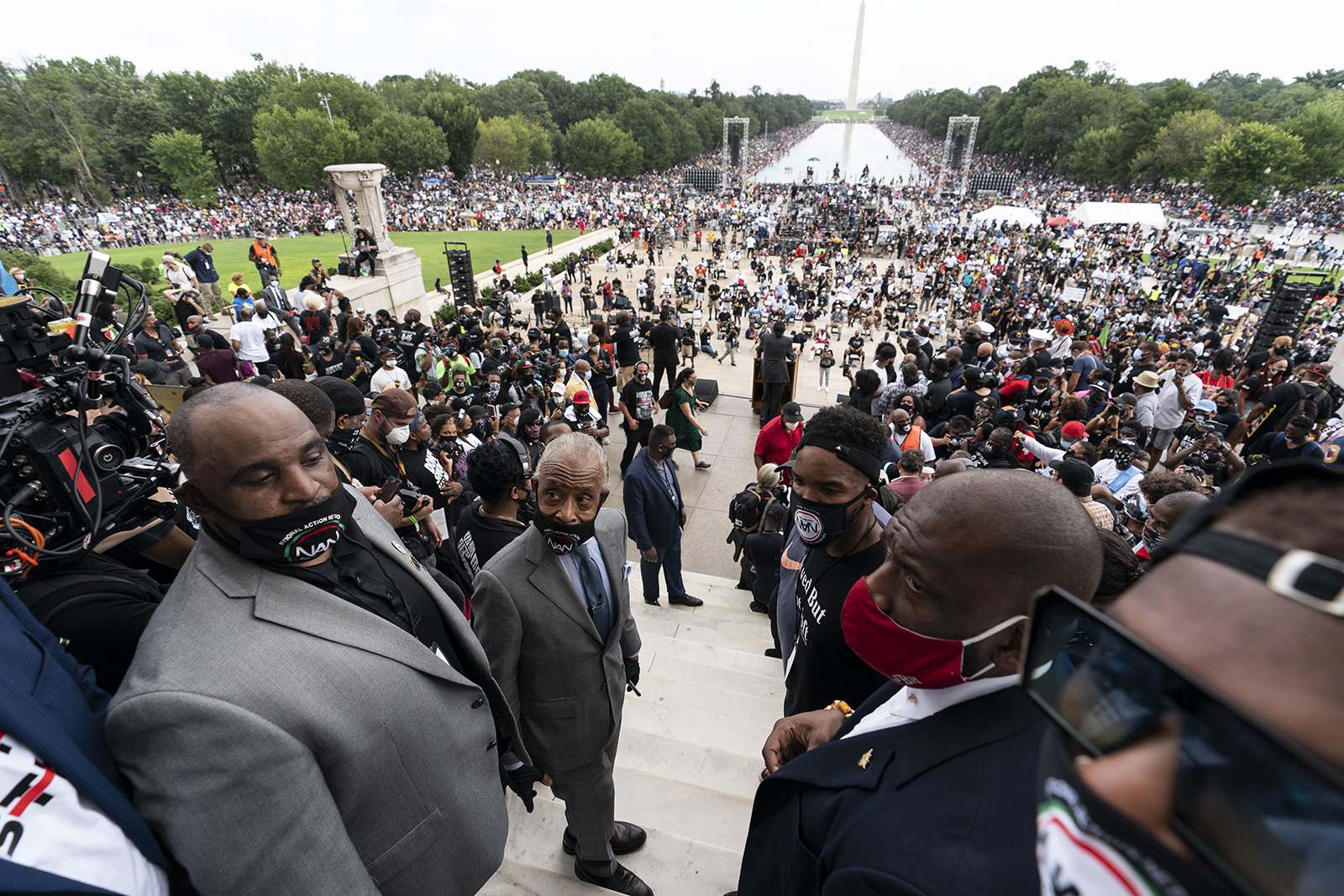
Rev. Al Sharpton, families of police shooting victims join march on Washington
Video Courtesy of NAACP
Preachers, politicians and family members of Black people who had been killed or shot by police gathered on the National Mall on the anniversary of the March on Washington.
They called for new legislation to address racial inequities in the country.
And they urged people to vote.
Among the speakers Friday (Aug. 28) was a son of Martin Luther King Jr.
He urged participants — who watched on television, online and in-person — to continue the work of the 1960s with what his father called the “coalition of conscience” by seeking a country that seeks love and health and dispels fear and hate.
“To achieve that America, we need to raise our voices and cast our votes,” King said. “There’s a knee upon the neck of democracy and our nation can only live so long without the oxygen of freedom.”
The Rev. Al Sharpton, president of the National Action Network, and other speakers echoed some of the same themes enunciated by the Rev. Martin Luther King Jr. in his “I Have a Dream” speech at the first march in 1963.
“We come in the same spiritual lineage,” said Sharpton, organizer of the Commitment March, after members of King’s family addressed the crowd. “’cause I want this country to know that even with your brutality you can’t rob us of our dreams.”
Sharpton announced the event — also called the “Get Your Knee Off Our Necks” march — as he preached at the funeral for George Floyd, a Black man who died in May under the knee of a white police officer.
Standing in front of the Lincoln Memorial before thousands, Sharpton said that Black people have long fought bigotry. But he noted that members of the interracial crowd that gathered in the same spot where others marched in 1963 have the power to move beyond their circumstances.
“We are the dream keepers, which is why we come today — black and white and all races and religions and sexual orientations — to say that this dream is still alive. You might have killed the dreamer but you can’t kill the dream.”

The Rev. Al Sharpton, left center, makes his way to the podium to speak during the March on Washington, Friday Aug. 28, 2020, at the Lincoln Memorial in Washington, on the 57th anniversary of the Rev. Martin Luther King Jr.’s “I Have A Dream” speech. (AP Photo/Alex Brandon)
Before the throngs of people started marching to the Martin Luther King Jr. Memorial, the granddaughter and a son of the famous civil rights leader took turns at the microphone to speak where their predecessor had appeared 57 years before.
“Americans are marching together — many for the first time — and we’re demanding real, lasting structural change,” said Martin Luther King III. “We are socially distanced but spiritually united. We are masking our faces but not our faith in freedom.”
The crowd was addressed by speakers mostly in person and some, including Democratic vice presidential nominee Kamala Harris, by video. Gospel singer BeBe Winans sang an original composition that he wrote to his then-15-year-old son after Freddie Gray died in the custody of Baltimore police in 2015.
“In one moment, dreams are scattered,” he sang. “Our sons and daughters matter. Black lives matter.”
Winans performed in between brief remarks by family members and lawyers of Black people who had been killed. They recalled their loved ones, thanked the crowd for their support and urged the marchers to vote. Many wore masks or T-shirts with names or images of their relatives.
“There are two systems of justice in the United States,” said the father and namesake of Jacob Blake, the man who was shot seven times in the back by police in Kenosha, Wisconsin, on Sunday. “There’s a white system and there’s a Black system. The Black system ain’t doing so well. But we’re going to stand up.”
While the elder Blake cited Allah, the Muslim name for God, in his remarks, other parents mentioned Bible verses as they urged continuing advocacy.
Sybrina Fulton, the mother of Trayvon Martin, whose killing in 2012 led to the Black Lives Matter movement, said her favorite passage is Proverbs 3:5-6, which begins: “Trust in the Lord with all your heart; lean not unto your own understanding.”
“Even though it looks dark, I want to tell you to be encouraged,” she said. “Don’t stop saying Black Lives Matter. Don’t stop peaceful protesting. Don’t stop praying. Don’t stop unifying. Stand together.”
In the pause between speeches, many of which called for legislation to improve voting rights and reform police agencies, the crowds and speakers often engaged in a call-and-response recitation of the names of people who had been killed over the years.
Event co-host Mark Thompson, a radio show host who was helping introduce the various speakers, acknowledged that many of the people representing those names didn’t have a chance to come to the microphone before it was time to march.
“Sisters and brothers,” he said, “the problem is the police have killed so many of us there’s not even enough time for us to hear from every family.”
